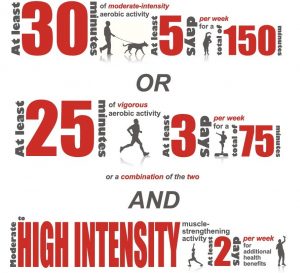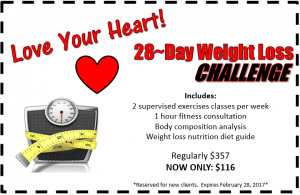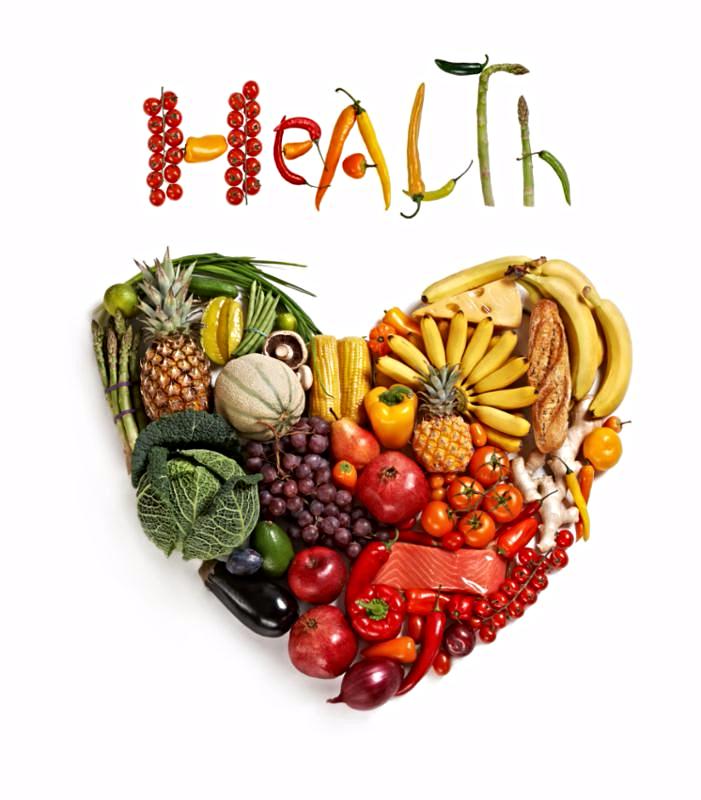February is National Heart Health Month! The goal in February is to raise awareness nation wide and show your support for the millions of people suffering from heart disease in the U.S. and around the world. Heart disease is the #1 killer in this country but with active awareness campaigns, the goal is to see those numbers decline in the coming years.
The Stats
- 1 in 4 American (about 600,000 people) die from heart disease every year

- Coronary heart disease (CHD) is the most common heart disease
-
CHD kills close to 400,000 a year
-
Every 60 seconds someone in the US dies from a heart disease-related event.
-
Every 25 seconds someone in the US will have a coronary event
AHA Recommendations
The American Heart Association has set up guidelines for physical activity to ensure not only a healthy heart but a healthy life:

– It important to achieve at least 30 minutes of moderate aerobic activity 5 or more days a week (more is better!).
-Don’t stop there, also try your best to include muscle strengthening exercises 2-3 days a week of all your major muscle groups
-Remember that moderate intensity is the equivalent of a 3-4 mph pace. Your exertion should be a 5-6 on a 10 point scale. You should be able to talk but not sing!
How Weight Loss Helps
Research has shown the importance of weight loss and the negative impact weight gain has on the risk factors associated with cardiovascular disease. Even small changes in weight can have benefits:
- 5-10% of weight loss
- Reduces CHD risk
- Improves high blood pressure
- Improves lipid profile
- Every 2.2 lbs of weight loss drops total cholesterol by 1%, LDL by 0.7% and increases HDL by 0.2%
- Every 2.2 lbs of weight gained after 18 years old leads to 5.7% increased risk for women and 3.1% increased risk for men in heart disease
- Decreasing blood pressure by 3 points leads to 15% reduction in risk of cardiovascular disease
- Each incremental increase of BMI by 1 unit increases risk of atrial fibrillation by 4%, stroke risk by 6%, and heart failure by 5% in men and 7% in women
- 10% weight loss improves
- Arthritis
- Kidney disease
- Gout
- Heart disease
- Infertility
- Liver disease
- Low back pain
- OBGYN complications
- Sleep apnea
- Stroke
- Pancreatic disorders
Go RED!
Follow a simple acronym known as G.O. R.E.D. to put you on the path to heart health:
February 3rd is Wear Red Day. Use this opportunity to spread awareness of heart disease, the #1 killer of men and women in America

Swap In The Good
- Eat fish high in omega-3s, such as salmon, tuna, mackerel, herring and trout.
- A handful of healthy nuts such as almonds or walnuts will satisfy your hunger and help your heart.
- Berries are chock full of heart-healthy phytonutrients and soluble fiber. Try blueberries, strawberries
 , cranberries or raspberries in cereal or yogurt.
, cranberries or raspberries in cereal or yogurt. - Flaxseeds contain omega-3 fatty acids, fiber and phytoestogens to boost heart health. Take them in ground or milled form to reap the greatest benefit.
- Oatmeal: the comfort-food nutrient powerhouse.
- Dark beans,such as kidney or black beans, are high in fiber, B-vitamins, minerals and other good stuff. Veggie chili, anyone?
- A 4-ounce glass of red wine (up to two for men and one for women per day) can help improve good (HDL) cholesterol levels.
- Try marinated tofu in a stir-fry with fresh veggies for a heart-healthy lunch or dinner.
- Red, yellow and orange veggies such as carrots, sweet potatoes, red peppers and acorn squash are packed with carotenoids, fiber and vitamins to help your heart.
- Popeye was right – spinach packs a punch! Use it in sandwiches and salads instead of lettuce.
- Fruits such as oranges, cantaloupes and papaya are rich in beta-carotene, potassium, magnesium and fiber.
- Tender, sweet asparagus is filled with mighty nutrients such as beta-carotene, folate and fiber, and only provide 25 calories per cup, or 5 calories per large spear.
- Tomatoes – even sun-dried varieties in winter months – provide lycopene, vitamin C and alpha- and beta-carotene.
- Dark chocolate is good for your heart health, but just be sure that it’s at least 70 percent cocoa.
- Crisp, fresh broccoli florets dipped in hummus are a terrific heart-healthy snack with a whopping list of nutrients, including vitamins C and E, potassium, folate, calcium and fiber.



 , cranberries or raspberries in cereal or yogurt.
, cranberries or raspberries in cereal or yogurt.